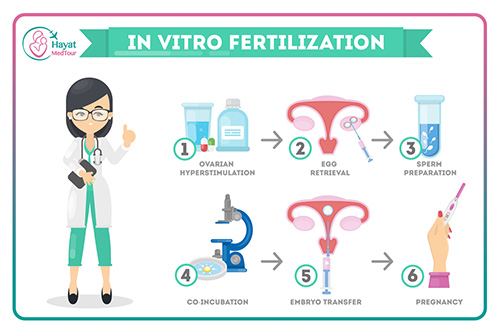Increase Your Chances of IVF Success
How to Increase Your Chances of IVF Success
If you are looking to increase your chances of conceiving during IVF, here are 8 tips from 5 different fertility doctors.

1. Maintain a healthy weight.
"Maintaining a healthy weight is extremely important in fertility and IVF," says Linnea Goodman, MD, Assistant Professor of Obstetrics and Gynecology at the UNC School of Medicine. "We know that being obese (BMI >35) and underweight (BMI <19) increases time of conception by 2 and 4 times respectively, and negatively effects IVF success rates. Being overweight also makes monitoring the ovaries during IVF more difficult and increases the chance of complications during egg retrievals."
This is best implemented with changes in diet and activity with professional help.
"Working with dietitian, and in some programs enrolling in a cardio metabolic weight loss program can help achieve these goals," says Zaraq Khan, MD, reproductive endocrinologist at Mayo Clinic in Rochester, MN.
2. Optimize sperm health.
"Use of multivitamins and maintaining optimal body weight, as well using boxers over briefs, could improve sperm quality," says Dr. Khan. "Under appropriate care, men can also be started on medications that can help boost sperm numbers and quality that can have a beneficial impact on IVF outcome. In certain cases, sperm aspirated directly from the testicle over ejaculate could also be beneficial. Involving a male infertility specialist for any form of abnormalities in semen analyses is key."
3. Partner with an excellent doctor and embryology laboratory.
"Choosing an excellent reproductive endocrinologist is twofold: in addition to experience and commitment to evidence-based medicine, look for someone with whom you feel comfortable and connected. Your doctor will accompany you on this very emotional journey and it is important for you to feel supported and heard," says Elizabeth Fino, MD, fertility specialist at NYU Langone Fertility Center. "Asking for recommendations from friends and family who know you best can help guide you to a knowledgeable physician with whom you feel comfortable, but also be sure to do your research."
In a world of online reviews, it can be difficult to determine credibility.
"Be careful of online reviews—they are often completed by select patients who had an extreme experience for one reason or another and may not be universally applicable. FertilityIQ offers a unique model which hones in on specific aspects of the experience after vetting patient reviews.
To find an excellent embryology laboratory, look for a long history of exceptional outcomes. One source is the Society for Assisted Reproductive Technology which details the clinic's volume and live birth rate."
4. Reduce your stress.
"Basal stress levels can influence natural and assisted conception rates," says Dr. Khan. "Reducing stress troubles during an IVF stimulation cycle can be one of the hardest things to achieve for couples. Several reports suggest improvement of pregnancy outcomes with the use of acupuncture and other stress relieving techniques, like enrolling in mind-body programs, stress reduction, and resilience training workshops."
5. Quit smoking
"Smoking can drastically decrease chance of success while doing IVF because it effects egg and sperm quality," says Dr. Khan.
But you don't have to do it on your own.
"Quitting smoking is not an easy task and often requires a great deal of personal as well as professional support. Try to involve your friends and family to help encourage you in the process. For smoking cessation, structured programs and/or pharmacological assistance have proven to be most successful," says Dr. Fino.
6. Look into taking supplements
"DHEA and CoQ10 are supplements that have shown some promise in association with an increase in egg quantity and quality," says Dr. Fino. "Talk to your doctor to see if he or she recommends them for you."
Multivitamins may also be helpful, adds Dr. Khan.
7. Ensure you have adequate levels of vitamin D
"Over 40% of individuals are deficient in Vitamin D, and there is emerging data on its association with infertility and worse IVF outcomes," says Tarun Jain, MD, medical director of Northwestern Medicine Fertility and Reproductive Medicine Oakbrook Terrace. "Ask your doctor to check your vitamin D level, and consider taking a vitamin D supplement."
8. Focus on persistence and patience.
"Many patients require more than one cycle of IVF to achieve an embryo for transfer and outcomes may vary significantly from cycle to cycle," says Shannon DeVore, MD, at NYU Langone Fertility Center. "If your first cycle wasn't successful, your doctor may be able to adjust the medications to optimize a subsequent one. Other times, it just means keeping at it. Try not to be discouraged by sub-optimal outcomes and setbacks—you are doing everything right. The single biggest thing to remember is that most (or all) of this is out of your control. Nobody likes lack of control, but sometimes letting go can help you endure the journey. Take care of yourself and don't blame yourself when things don't go well. You are not alone, it often takes a village to build a family."
- ۰ نظر
- 29 August 21 ، 08:05
- ۱۹۸ نمایش


